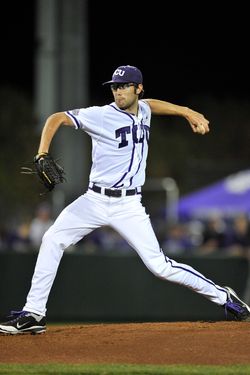Draft Prospect Q&A: Michael Chavis
MLBTR is re-launching its Draft Prospect Q&A series this season in order to give our readers a look at some of the top names on the board in this year’s draft. MLBTR will be chatting with some of the draft’s most well-regarded prospects over the next couple of weeks as they prepare for the 2014 draft on June 5-7.
Scouts see Georgia high school prospect Michael Chavis as someone who can do it all thanks to his well-rounded skill set as well as his versatility. Chavis spent most of his career at Sprayberry High School at the shortstop position but he also boasts arm strength that can allow him to play anywhere in the infield. He’s got the speed to play second base or stick at shortstop, and while he has a bit of experience behind the plate and in the outfield, most say his big league future is at third base. The Clemson commit is ranked No. 21 by MLB.com, No. 26 by Baseball America, and No. 27 by ESPN.com’s Keith Law.
The first-round prospect left high school on a high note, slashing .557/.580/.663 with 13 homers in his senior season. At the plate, Chavis flashed his plus bat speed as well as his plus raw power, which helped him to win the Perfect Game Home Run Derby over other notable prospects such as Alex Jackson, Braxton Davidson, and Michael Gettys.
The charismatic and confident young man spoke with MLBTradeRumors recently about what position he wants to ultimately play, the prospect of going to Clemson, and more:
Draft Prospect Q&A: Nick Gordon
MLBTR is re-launching its Draft Prospect Q&A series this season in order to give our readers a look at some of the top names on the board in this year’s draft. MLBTR will be chatting with some of the draft’s most well-regarded prospects over the next couple of weeks as they prepare for the 2014 draft on June 5-7.
Florida’s Nick Gordon is universally regarded as the best shortstop in the 2014 draft and, according to some, is the best position player prospect in the draft. With a pedigree like his, it’s no surprise. Gordon is the son of three-time All-Star right-hander Tom “Flash” Gordon and the younger brother of Dodgers second baseman Dee Gordon. While his father made his mark in the game and Dee continues to see his star rise, all signs point to Nick making a terrific legacy of his own in the years to come.
At 6’2″, 170, Gordon exhibits tremendous speed both on defense and around the base paths. Of course, he also boasts a terrific arm for the shortstop position and, in fact, many believe that he could pursue pitching if he wanted to. At the plate, the Olympia High School star projects to be an above-average hitter, but his intangibles and makeup have scouts drooling just as much as his physical tools.
In 27 games last season, Gordon, reportedly being advised by Beverly Hills Sports Council, which also represented father Tom “Flash” Gordon and represents brother Dee, posted an absurd slash line of .494/.576/.843 in 99 plate appearances and stole 13 bases. The youngster has had the attention of college scouts and pro scouts alike for years, but his senior season helped to boost his stock even further.
Gordon, ranked as the fourth-best prospect in the draft by ESPN.com’s Keith Law, No. 5 by MLB.com, and No. 7 by Baseball America, spoke with MLBTradeRumors late last week about the draft process, the possibility of going No. 1 overall, and what he’s learned from watching his father and brother:
Draft Prospect Q&A: Nick Burdi
MLBTR is re-launching its Draft Prospect Q&A series this season in order to give our readers a look at some of the top names on the board in this year’s draft. MLBTR will be chatting with some of the draft’s most well-regarded prospects over the next couple of weeks as they prepare for the 2014 draft on June 5-7.
Teams looking to draft a future closer with serious velocity will be taking a long look at Louisville pitcher Nick Burdi. In fact, with a fastball that hits 96-100 mph on the radar gun, Burdi stands as the hardest thrower in college. To complement the heat, Burdi also boasts a plus slider that can develop into a premium pitch.
You could say that hard throwing runs in the family. Burdi’s older brother, Drew, was a quarterback at Western Michigan. His younger brother, Zack, is a promising pitcher in his own right for the Cardinals. Burdi has shown that he can hold that velocity over two- and three-inning outings, leading some to believe that he could blossom into a starter. Baseball America has Burdi pegged as the No. 27 prospect in the draft, MLB.com has him ranked at No. 34, and ESPN.com’s Keith Law has him at No. 52. Burdi spoke with MLBTradeRumors on Friday about his skill set, whether he’d be interested in starting, and more:
Draft Prospect Q&A: Bradley Zimmer
MLBTR is re-launching its Draft Prospect Q&A series this season in order to give our readers a look at some of the top names on the board in this year’s draft. MLBTR will be chatting with some of the draft’s most well-regarded prospects over the next couple of weeks as they prepare for the 2014 draft on June 5-7.
University of San Francisco center fielder Bradley Zimmer is considered by some to be the best college position player in this year’s draft. The brother of Royals prospect and 2012 No. 5 overall pick, Kyle Zimmer, Bradley is ranked as the fifth-best prospect in this draft class by ESPN’s Keith Law (ESPN Insider subscription required and recommended). Baseball America has Zimmer ranked 14th, and MLB.com currently ranks him No. 10.
The 6’5″, 205-pound Zimmer put himself on the prospect map with an outstanding sophomore season in 2013 when he slashed .320/.437/.512 with 29 walks with seven home runs against just 31 strikeouts in 58 games.
He’s followed up that breakout campaign with an even more impressive .368/.461/.573 batting line to go along with seven homers, seven triples and 10 doubles. Once again, he’s walking (31 times) almost as often as he strikes out (34), and he’s swiped 21 bases in 32 tries in 2014. Bradley was kind enough to take some time out of his busy schedule to talk with MLBTR last week:
Draft Prospect Q&A: Anthony Rendon
As the 2011 Draft draws closer, MLBTR will be introducing you to a handful of the top eligible prospects with a series of Q&As. The series includes four of the top college pitchers in the nation and a top college position player. Here's another position player to watch.
Rice third baseman Anthony Rendon is considered the top college position player in the 2011 draft and he remains a candidate to be the first overall pick this June. Both Baseball America and ESPN.com have reported within the week that it appears Rendon will either go first overall (to the Pirates) or second (to the Mariners) with UCLA right-hander Gerrit Cole going to the other team.
Rendon entered the season as the top prospect in the draft after being named Baseball America's Player of the Year in 2010 and the publication's Freshman of the Year in 2009. Ankle and shoulder injuries have slowed Rendon down this year and limited his time at third base, where he is considered an excellent defender. The 20-year-old Houston native shines at the plate as well and has a .350/.552/.552 line with 62 walks so far this season.
I spoke to Rendon earlier today about his injuries, the team he rooted for growing up and the hype surrounding the draft. Here's a transcript of our conversation:
Draft Prospect Q&A: Danny Hultzen
As the 2011 Draft draws closer, MLBTR will be introducing you to a handful of the top eligible prospects with a series of Q&As. The series started with three of the top college pitchers in the nation and a top college position player. Here's another arm to watch.
Danny Hultzen was the ACC pitcher of the year and a semi-finalist for the Golden Spikes Award last year, but even he is a little surprised by how well the 2011 season is going. The Virginia left-hander has helped lead the Cavaliers to a 36-3 record and the top ranking in the country thanks to his arm and his bat.
Baseball America's Midseason Player of the Year is climbing up draft boards and may be the third-best draft prospect in the country behind Anthony Rendon and Gerrit Cole. ESPN.com's Keith Law reported last week that the D'Backs, Orioles and Royals are among the teams eyeing Hultzen. Anyone picking much later on can likely forget about him, since he doesn't figure to be available for long.
Earlier today I spoke to the 21-year-old about his team's title hopes, his two-way play and the draft. Here's what he had to say:
Draft Prospect Q&A: George Springer
As the 2011 Draft draws closer, MLBTR will be introducing you to a handful of the top eligible prospects with a series of Q&As. The series started with three of the top college pitchers in the nation and continues today with a college position player.
Teams looking for powerful outfielders with speed to spare will be intrigued by George Springer of the UConn Huskies. The 6'4" 21-year-old has improved his draft stock dramatically since the Twins selected him in the 48th round of the 2008 draft; Springer is now a projected first round pick.
In its college baseball preview, Baseball America described Springer as one of the nation's best power hitters, who's a superb defender and a "plus-plus" runner to boot.
He hit 18 homers with 33 steals, 60 walks, 84 runs and a .491 on-base average last year, prompting ESPN.com's Keith Law to rate him second among eligible prospects last month. Law described Springer as "an athletic outfielder with an above-average arm who projects to hit and hit for power and just needs to refine his approach, especially with two strikes."
Springer started slowly and some said to ESPN that he changed his mechanics. After collecting just three hits in his first six games (22 at bats), Springer appears to have rediscovered his stroke, as his numbers are on the rise.
He spoke with MLBTR after UConn's loss to Sacred Heart today. Here's what he had to say:
Draft Prospect Q&A: Gerrit Cole
As the 2011 Draft draws closer, MLBTR will be introducing you to a handful of the top eligible prospects with a series of Q&As. The series started with two of the top college pitchers in the nation and continues today with another one.
UCLA right-hander Gerrit Cole was one of the top draft prospects in the country before last week, but his performance against Nebraska on Friday sure didn't hurt his stock. Cole pitched nine innings of two-hit, shutout ball, taking a perfect game into the seventh inning and striking out eight.
It's not particularly surprising to see the 6'4" 20-year-old thriving. Baseball America announced earlier in the year that his mid-90s fastball and devastating slider give him "best pure stuff in the [2011] draft" and Cole struck out 153 batters in 123 innings last year, helping the Bruins reach the College World Series finals.
Cole has been a known commodity for years, since the Yankees selected the power pitcher in the first round of the 2008 draft out of high school. He will likely go higher than 28th overall in 2011; ESPN.com's Jason A. Churchill and Keith Law suggested last week that Cole is a threat to surpass Anthony Rendon and go first overall this June.
MLBTR chatted with Cole about his most recent outing, turning down the team his family cheers for and having Charlie Sheen show up at his team's practices. Click through to read our conversation:
Draft Prospect Q&A: Matt Purke
As the 2011 Draft draws closer, MLBTR will be introducing you to a handful of the top eligible prospects with a series of Q&As. The series debuted last week with one of the top college pitchers in the nation and continues today with another.
Matt Purke pitched well enough as a high schooler to go in the first round of the 2009 draft. He didn't sign with the Rangers, who selected him 14th overall, and instead joined the TCU Horned Frogs. He led the team to its first ever College World Series appearance last year with a shiny 16-0 record and 142 strikeouts in 116 innings.
The 20-year-old sophomore is draft eligible once again and, according to Baseball America and ESPN.com's Keith Law, should go in the first round once again, possibly first overall. Baseball America called Purke "a bona fide ace with a lively 91-94 mph fastball and a wipeout slider" that can overmatch hitters. Purke calls his breaking ball a curve, but he isn't going to get into an argument about semantics with the publication that named him the 2010 Baseball America Freshman of the Year.
Purke talked to MLBTR this afternoon. Here's what we discussed:
Draft Prospect Q&A: Sonny Gray
As the 2011 Draft draws closer, MLBTR will be introducing you to a handful of the top eligible prospects with a series of Q&As. The series debuts today with one of the top college pitchers in the nation.
Vanderbilt right-hander Sonny Gray has "the best curveball in college baseball," according to Baseball America, and ESPN.com's Keith Law suggested last week that he has an outside shot of being the first overall pick this June. According to Baseball America, some scouts wonder if Gray's future is in the bullpen. But with an above-average curve, a 93-96 mph fastball and a change-up, he could become a starter like Mike Minor and David Price, two Vanderbilt products who were selected in the first round.
Gray talked to MLBTR about his size, his curveball and Roy Halladay. Here's a transcript of our conversation:








